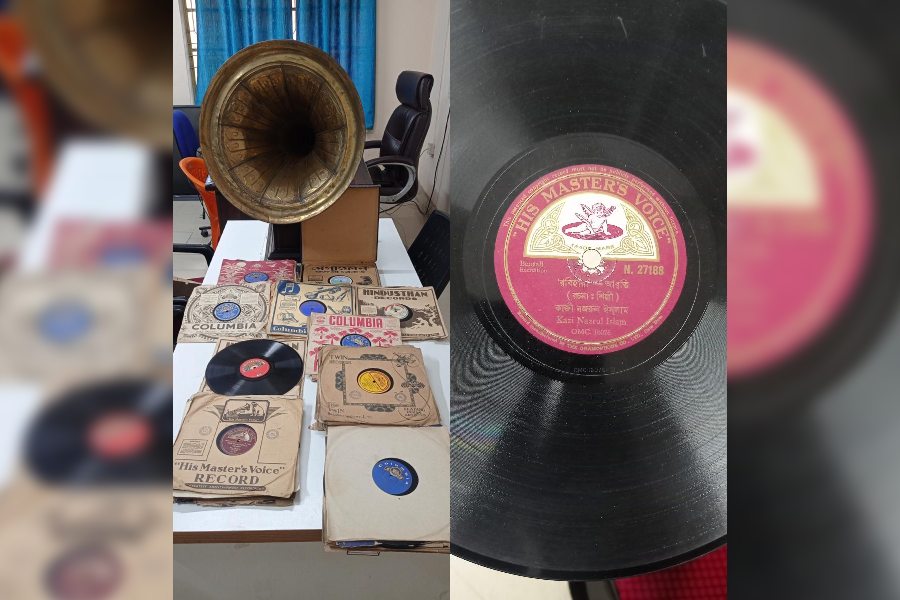Kazi Nazrul University in Asansol has been selected by the British Library for grants for two pilot projects to digitise some of Nazrul Islam’s works and diary notes.
The Endangered Archives Programme offers about 30 grants every year to enable researchers to preserve culturally important archives through digitisation.
“This support from the British Library is a great boost for the archiving efforts being undertaken at our university. The digitisation will provide new insights to researchers about the life and literature, music and the mind of Nazrul Islam as well as the socio-cultural, political and economic milieu of the time. Both grants are for pilot projects with a maximum duration of 12 months and a budget limit of £15,000,” said interim vice-chancellor Debashis Bandyopadhyay.
The two projects are focused on Nazrul studies but are separate entities — one dealing with documents and the other with audio material.
“The university has a museum on Asansol’s industrial heritage called Setubandha, which has a collection of Nazrul’s draft manuscripts, diaries, photographs and letters. Much of this has been in the possession of Nazrul Academy, which has safeguarded the collection for the past 40 years at Nazrul’s birthplace in Churulia (a suburb of Asansol). In 2020, the academy and its properties, including Nazrul’s ancestral house, were handed over by the poet’s extended family to our university. For the last three years, we have also been organising the Nazrul Mela that happens during his birth anniversary,” said Santanu Banerjee, who teaches English at the university and is the Setubandha library curator.
The manuscripts, being drafts, reveal interesting insights.
“Nazrul scribbled notes on the margins — which song is being composed for whom and fetching how much, which creditor needs to be paid…. Horoscopes are drawn on the margins. These validate references to Nazrul practising astrology in the memoirs of contemporaries. There is an incomplete radio play on Dara Shikoh, beside which, he mentions which books on Mughal history he has referred to,” said Banerjee, who had applied for the grant along with co-principal investigator Rajarshi Das, librarian at Banwarilal Bhalotia College of Asansol.
Banerjee pointed out that such primary evidence would lend credence to accounts in Nazrul biographies. “His personal life and his creative life coalesce on these pages.”
There are 13 volumes of his notebooks, totalling about 1,200 pages, which will now be digitised. The curator has tried to date the notebooks through the songs written in them. “We know the phases in which he composed Islami songs or bhaktigeetis,” he said, adding they were likely to be from 1930-1940.
But some are later-day entries by his wife Pramila Sengupta who, despite being paralysed waist-down, used to jot down daily expenses and royalties due after Nazrul fell ill. His sons have also written in some.
There is also a copy of the family’s Quran, copied by the maulvi of the mosque where Nazrul worked as a muezzin. “It has beautiful calligraphy on Indian parchment,” Banerjee said.
The other project is a collection of gramophone records at the university’s Nazrul Centre for Social and Cultural Studies.
“We procured about 4,000 shellac records from the famed collection of Surajlal Mukhopadhyay. These include two of the three albums in Nazrul’s voice and Nazrulgeetis sung by contemporary artistes, as also miscellaneous contemporary music releases and 120 plays written by the likes of Nazrul, D.L. Roy, Rabindranath Tagore and the first crop of the Indian People’s Theatre Association movement. Contextuality plays a big role in socio-cultural studies,” said research associate and acting curator Gourav Chowdhury, who leads a team of four.
There are film records, too, as Nazrul was music director in some like Gora and his songs would be used in other films.
The centre owns three gramophone players. Two from the Surajlal collection, a horn gramophone and a 1921 almirah gramophone, are in working condition. The third, an HMV player kept at Churulia, was used by Nazrul. “The university plans to repair it,” Chowdhury said.
The records need to be digitised as the disc grooves would erode with repeated playing. Copies of the archived material will be kept with the principal investigators and the British Library.
Members of both teams have attended workshops conducted by the School of Cultural Texts and Records jointly with the British Library at Jadavpur University. Equipment will be purchased once the first instalment of the grant arrives.











